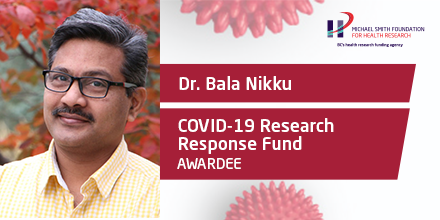Mapping the Social Epidemiology of front-line health-care workers
7 January 2021

Front-line health-care workers, from nurses to social workers, have been praised as heroes of the COVID-19 pandemic.
But what do we know about the inner workings of their personal and professional lives? When they go home at the end of the day, how do their families receive them knowing they have been in contact with people who are COVID-19 positive – and do they also care for children or aging parents? Are they experiencing depression or anxiety? How loyal do they feel to their workplace? How are these workers managing their emotional wellness?
These are among the many questions raised through research led by Dr. Bala Nikku, assistant professor of Social Work at Thompson Rivers University and supported by MSFHR’s COVID-19 Research Response Fund.
Bringing together a unique combination of psychological, qualitative and computer simulation data, Dr. Nikku and his team are setting out to map the experiences of health-care workers in home-care and long-term care facilities across British Columbia during the pandemic.
The expectation is that health policy makers will be able to use the evidence-based results to make key changes that will improve the lives of these front-line health-care workers.
“Front-line health-care workers are the building blocks of the health-care system, yet they have jobs that are precarious, they may be visible minorities, and they are not paid well or are underpaid,” said Dr. Nikku, a racialized scholar who arrived in Canada two years ago. “They may be facing discrimination and stigma. I am hopeful that this research can lead to critical changes that will have a positive impact on their lives.”
To answer these questions, with the help of collaborators from Interior Health, Vancouver Island Health Authority, the BC Nurses’ Union and the Hospital Employees’ Union, this mixed methods research will progress through four distinct phases.
Kicking off the study, his team will launch a 30-minute survey questionnaire focused on the psycho-social wellbeing aspects of front-line health-care workers in home-care and long-term care facilities. Questions range from what emotions they are experiencing to how they are showing up to work. The survey will be anonymous, and participation will be voluntary. The aim is to receive 100 responses from all ages, genders, and races across the province.
Next, the team will reach out to 30 front-line health-care workers to voluntarily talk about their lives and well-being in detail. Taking place over phone calls, the qualitative interviews will be 40 to 60 minutes each and cover topics such as the impact of COVID-19 on their personal lives and family care responsibilities. Similar to the questionnaire, Dr. Nikku hopes to capture all ages, genders and races.
The collected data will then be inputted into a computer simulation model. The Agent based simulation models will allow the team to analyze the results by controlling for different variables. For example, how people from a certain racial background or age group are faring emotionally across the province. The simulation data allows the team members with the ability to run different scenarios and determine how a small change in the agent’s behaviour or policy can influence the population.
Capping off the study, the research team will conduct a social network analysis to unearth how the different social networks that front-line health-care workers belong to in turn influence their work-life choices.
Through the various thoughtful and innovative streams of data collection and analysis, Dr. Nikku hopes to bring to light the full, nuanced experiences of front-line health-care workers. And with that information, he hopes health policy makers will be better equipped to support these professionals as they undertake the important – and lifesaving – work of caring for vulnerable populations during the pandemic and putting their own lives at risk.
Launched on April 6, 2020 and funded by the Province of BC, the MSFHR COVID-19 Research Response Fund supports urgent research needs important to British Columbia that have arisen as a result of the COVID-19 pandemic. The funding is just one part of a coordinated British Columbian health research approach involving assets that support health research as well as innovative, cross-disciplinary researchers and teams.
As BC’s health research funding agency, MSFHR is committed to enabling responsive, relevant research to support British Columbia’s efforts surrounding the pandemic and ensuring that the health research community has the resources it needs to continue doing world-class research during a time of rapid and inequitable change.





